|
|
| |
| EVENTS |
|
|
> Government committed to ensure constitutional and legal framework for free, fair and credible elections: Senator Babar Awan
|
|
|
|
| |
Islamabad March 1; In a PILDAT Legislative Forum on Election Laws (Amendment) Bill, 2011, Senator Zaheeruddin Babar Awan, Federal Minister for Law, Justice and Parliamentary Affairs, said that the government is determent to institute a comprehensive constitutional and legal framework for electoral reforms to ensure free, fair and credible elections in Pakistan for the prosperity and sustainability of democracy in Pakistan. He said he welcomes the review and recommendations on the Election Laws (Amendment) Bill, 2011 which the Parliament must consider and approve after considering all possibilities to improve the draft law. He said that after having served in opposition too, Peoples Party is committed to facilitate such electoral reforms through which no one can challenge election results in the future. He said that the party is also committed to ensure that it should be a criminal offence if 52% women of this country�s population in any way are discouraged or barred from voting in elections. |
|
| |
Senator Zaheer Uddin Babar Awan, Federal Minister for Law, justice and Parliamentary Affairs, was the chief guest at the PILDAT Forum while speakers at the Forum included Senator Mir Jan Muhammad Jamali, Deputy Chairman Senate, Dr. Farooq Sattar, MNA, Parliamentary Leader MQM, Mr. Shahid Hamid, Senior Advocate Supreme Court of Pakistan and former Federal Minister of Defence, Establishment and Law and former Governor Punjab, Syed Nayyer Hussain Bukhari, Leader of the House in the Senate, Mr. Tariq Malik, Deputy Chairman NADRA and Mr. Wazir Ahmed Jogezai, former Deputy Speaker National Assembly. A large number of Parliamentarians from major political parties, columnists and media representatives activiely participated in the Forum contributing in terms of review and recommendations to the draft law.
|
|
| |
A PILDAT Legislative Brief analyzing the Election Laws (Amendment) Bill, 2011, was especially prepared and disseminated to participants in both Urdu and English languages. |
|
| |
While appreciating the draft bill, prticipants of the Forum believed that greater control of Election Commission on electoral staff, making obstruction of female voting a criminal offence, accessibility of polling stations, etc. should be ensured. Participants generally welcomed the role of NADRA in updating electoral rolls and the use of CNICs as a pre-requisite for voting. |
|
| |
Senator Mir Jan Muhammad Jamali said that election rules should be made stringent keeping in view cultural and social practices. He stressed that Senate should be an elected directly to make it stronger. |
|
| |
Senator Syed Nayyar Hussain Bukhari said that that for fair and free elections, electoral rolls are basic ingredient which should be error free and transparent. He said that this election laws amendment Bill 2011 was unanimously passed from Senate Standing Committee. He stressed that duplication of voters enrollment should be deleted from the list with the help of NADRA. |
|
| |
Dr. Farooq Sattar welcomed electoral reforms contained in draft law and said that all political parties and people of Pakistan want fair and free election which could only be held if Election Commission is independent. He believed that oversees Pakistanis should be given the right to vote and for this purpose we need to amend our election registration laws. |
|
| |
Mr. Shahid Hamid, who presented an overview of the draft bill, said that Bill offers a limited set of electoral reforms mainly corresponding to the constitutional requirements after the passage of the 18th Amendment. Although a welcome step, the bill needs to incorporate many other areas of required electoral reforms. He said that while the draft bill authorizes the Election Tribunal to appoint a local commission for recording of evidence for speedy trial, in essence sufficient number of dedicated judges are needed to be appointed to be assigned the work of Election Tribunals so that they can exclusively hear election petitions and not take up any other burden during the period of hearing and disposing election petitions. This could be better achieved if Judges from High Courts other than the High Court in which parties are resident were to try petitions pertaining to such parties i.e., Judges of the Sindh High Court should try cases pertaining to Punjab. The Tribunals should exclusively hear and dispose election petitions during the 120 days period stipulated by law. A period should also be fixed within which the appeals should also be decided. He also highlighted that the clauses of the draft bill providing for punishment of ECP employees breaching security or integrity of the electoral rolls database or publishing the information without authorization are generally vague and potential to abuse and therefore need to be specific. |
|
| |
|
|
| |
|
|
| |

|
|
| |
|
|
| |
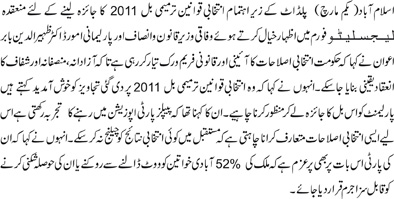
|
|
| |
|
|
| |

|
|
| |
|
|
| |

|
|
| |
|
|
| |

|
|
| |
|
|
| |

|
|
| |
|
|
| |

|
|
| |
|
|
| |

|
|
| |
|
|
| |
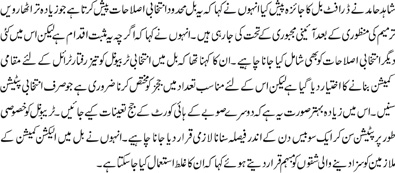
|
|
| |
|
|
| |

|
|
| |
|
|
| |

|
|
| |
|
|
| |
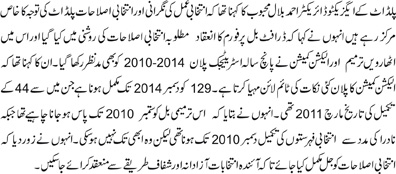
|
|
| |
|
|
| |

|
|
| |
|
|
| |
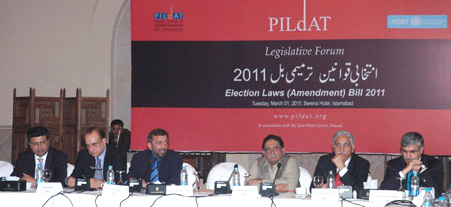
|
|
| |
|
|
| |
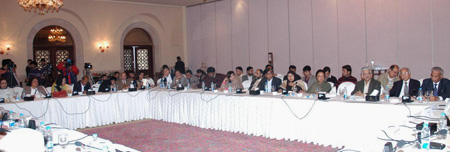
|
|
| |
|
|
| |

|
|
|
|
|
|
|
|
|